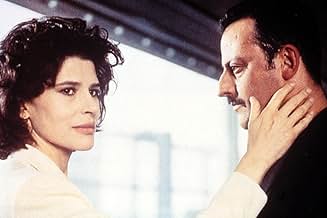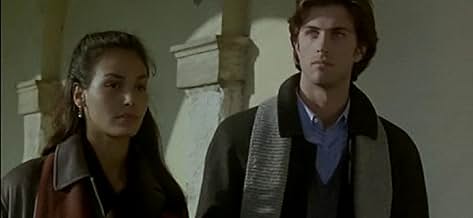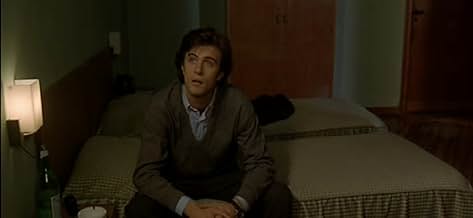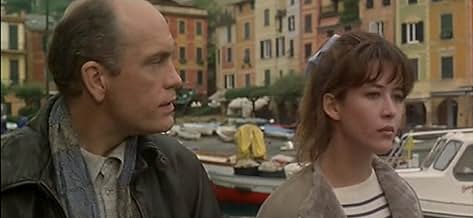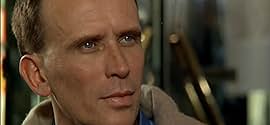CALIFICACIÓN DE IMDb
6.4/10
6.4 k
TU CALIFICACIÓN
Cuatro historias sobre relaciones cortas o largas entre hombres y mujeres en Italia y Francia.Cuatro historias sobre relaciones cortas o largas entre hombres y mujeres en Italia y Francia.Cuatro historias sobre relaciones cortas o largas entre hombres y mujeres en Italia y Francia.
- Dirección
- Guionistas
- Elenco
- Premios
- 3 premios ganados y 6 nominaciones en total
Kim Rossi Stuart
- Silvano
- (as Kim Rossi-Stuart)
Inés Sastre
- Carmen
- (as Ines Sastre)
Opiniones destacadas
Even though the story is light, the movie flows so beautifully and its visual so tranquil and poetic that it could almost carry the whole movie.
The film consists of four interconnected stories, all about different aspect of attraction between man and/or woman and how it frequently is ethereal. Their true desire seems to be always something that they cannot hold onto, it will flow out like a handful of sand.
I thought the most intriguing story was the last one where the more unattainable the woman was, the more the man desires her. It parallels her deep love for god, who is infinitely out of reach, but never closer to her heart.
A very good movie. 7/10
The film consists of four interconnected stories, all about different aspect of attraction between man and/or woman and how it frequently is ethereal. Their true desire seems to be always something that they cannot hold onto, it will flow out like a handful of sand.
I thought the most intriguing story was the last one where the more unattainable the woman was, the more the man desires her. It parallels her deep love for god, who is infinitely out of reach, but never closer to her heart.
A very good movie. 7/10
Although I'm a big fan of his work, and specially his revolutionary masterpieces, I would say this film did not live up to my expectations regarding Antonioni's abilities. In one word, I found myself utterly bored. I could not bring myself to share any emotions with the characters (no matter how hard I tried) and finally gave up on watching it. Malkovich was poorly casted and instead of bringing warmth and real human emotions to the character, made it a drag and sometimes impossible to follow. There are no real links for this four short stories, and least of all Malkovich's ramblings and philosophical (attempts at best) remarks bordering on sunday sermons. If you want good quality film, better stick to the director's earlier works. Sorry!!!
This is a special film if you know the context. Antonioni, in his eighties, had been crippled by a stroke. Mute and half paralyzed, his friends -- who incidentally are the best the film world has -- arranged for him to 'direct' a last significant film. The idea is that he can conjure a story into being by just looking at it. So we have a film: about a director who conjures stories by simple observation. And the matter of the (four) stories is about how the visual imagination defines love.
The film emerges by giving us the tools to bring it into being through our own imagination. The result is pure movie-world: every person (except the director) is lovely in aspect or movement. Some of these women are ultralovely, and they exist in a dreamy misty world of sensual encounter. There is no nuance, no hint that anything exists but what we see; no desire is at work other than what we create.
I know of no other film that so successfully manipulates our own visual yearning to have us create the world we see. He understands something about not touching. No one understands Van Morrison visually like he does. Morrison's Celtic space music is predicated on precisely the same notion: the sensual touch that implies but doesn't physically touch.
Antonioni's redhead wife appears, appropriately as the shopkeeper and she also directs a lackluster 'making of' film that is on the DVD.
Ted's Evaluation -- 3 of 4: Worth watching.
The film emerges by giving us the tools to bring it into being through our own imagination. The result is pure movie-world: every person (except the director) is lovely in aspect or movement. Some of these women are ultralovely, and they exist in a dreamy misty world of sensual encounter. There is no nuance, no hint that anything exists but what we see; no desire is at work other than what we create.
I know of no other film that so successfully manipulates our own visual yearning to have us create the world we see. He understands something about not touching. No one understands Van Morrison visually like he does. Morrison's Celtic space music is predicated on precisely the same notion: the sensual touch that implies but doesn't physically touch.
Antonioni's redhead wife appears, appropriately as the shopkeeper and she also directs a lackluster 'making of' film that is on the DVD.
Ted's Evaluation -- 3 of 4: Worth watching.
Michelangelo Antonioni is one of the major figures of cinema history, even if most people haven't heard of him. He was nowhere near as prolific as filmmakers such as Fellini, Godard, Bergman, Kurosawa, or Truffaut. And his films now are difficult to procure. There are only a few readily available, and I have seen all of those but one (Il Grido, which has recently been released on DVD by Kino). Four of the five Antonioni films that I've seen, L'Avventura, Red Desert, Blowup, and The Passenger are among the best films ever made. One other that I've seen, L'Eclisse, I think probably is also to be included among them; if only the video that I saw would not have been so horribly defiled! Now I have seen Beyond the Clouds.
I had always heard that it was a great failure, but it was difficult to lower my expectations of Antonioni. Wim Wenders' presence did not help, either. Throughout the film, there were many things that annoyed me, and also many things that I loved. I think a pros/cons list will help here.
Cons:
1. The writing seems weak. All the stories told have little depth, it seems, and we find out almost nothing about anybody we meet in the picture. Usually, Antonioni's writing can be used to show just how well a film can be written, and his characters are the definition of "complex." But in another way I can also see the style of writing presented here in a more positive light, which I'll comment on later.
2. The acting is really weak. I cannot in any way defend it. There is not one performer who isn't subpar here, and most of the actors are second-rate actors in the first place (Irene Jacob excepted). John Malkovich is one of the hammiest actors who's ever lived. The only thing I ever liked him in was Being John Malkovich, because that film delightfully (and, apparently, unnoticeably, at any rate by Malkovich himself) mocked his very pretensions, which are in full force in this film.
3. Casual nudity - okay, no one on Earth wants to see John Malkovich buck naked. Fortunately, if you are a fan of female nudity, nearly every woman in the film, including Bond girl Sophie Marceau, appears naked from head to foot with everything in between (sorry, Irene Jacob fans, no nudity from her!). I myself don't mind nudity when it is called for, like in Last Tango in Paris, but the rampant nudity in this film makes it seem like European softcore along the lines of Emmanuel. Actually, the softcore it really reminded me of was Red Shoe Diaries. The light jazz by Van Morrison just adds to this effect. Antonioni was once a proto-feminist. Many of his most famous films were from a distinctly female point of view. And when men did take over in his films, they were very unlikable. Here, the women are often exploited.
Pros:
1. Cinematography - okay, we have two of the best visual directors of all time working on this film, the cinematography ought to be outstanding. It is, generally. There are a couple of visual moments that are absolutely spectacular, some of the best I've ever seen. This includes an ethereal scene where Malkovich explores a deserted playground on a beach. He sits on a swing, spins around in it with a shot that involves a beautifully moving camera, and then we watch a strong wind blow sand around on the beach (Antonioni loves showing the wind in his films). Another great visual scene involves a camera gliding about a spiral staircase near the end of the film.
2. Mood - The nonchalant flow of the narrative actually adds a lot of mood. The title of the film is entirely appropriate. You do feel as if you're witnessing something beyond the clouds. Certain stories are left in suspension, never to be resolved, and it feels right. By the final scene, Beyond the Clouds had nearly won me over. Still, there were too many things wrong with it to suggest it to non-Antonioni fans, but Antonioni fans owe it to themselves to see it once. 6/10
I had always heard that it was a great failure, but it was difficult to lower my expectations of Antonioni. Wim Wenders' presence did not help, either. Throughout the film, there were many things that annoyed me, and also many things that I loved. I think a pros/cons list will help here.
Cons:
1. The writing seems weak. All the stories told have little depth, it seems, and we find out almost nothing about anybody we meet in the picture. Usually, Antonioni's writing can be used to show just how well a film can be written, and his characters are the definition of "complex." But in another way I can also see the style of writing presented here in a more positive light, which I'll comment on later.
2. The acting is really weak. I cannot in any way defend it. There is not one performer who isn't subpar here, and most of the actors are second-rate actors in the first place (Irene Jacob excepted). John Malkovich is one of the hammiest actors who's ever lived. The only thing I ever liked him in was Being John Malkovich, because that film delightfully (and, apparently, unnoticeably, at any rate by Malkovich himself) mocked his very pretensions, which are in full force in this film.
3. Casual nudity - okay, no one on Earth wants to see John Malkovich buck naked. Fortunately, if you are a fan of female nudity, nearly every woman in the film, including Bond girl Sophie Marceau, appears naked from head to foot with everything in between (sorry, Irene Jacob fans, no nudity from her!). I myself don't mind nudity when it is called for, like in Last Tango in Paris, but the rampant nudity in this film makes it seem like European softcore along the lines of Emmanuel. Actually, the softcore it really reminded me of was Red Shoe Diaries. The light jazz by Van Morrison just adds to this effect. Antonioni was once a proto-feminist. Many of his most famous films were from a distinctly female point of view. And when men did take over in his films, they were very unlikable. Here, the women are often exploited.
Pros:
1. Cinematography - okay, we have two of the best visual directors of all time working on this film, the cinematography ought to be outstanding. It is, generally. There are a couple of visual moments that are absolutely spectacular, some of the best I've ever seen. This includes an ethereal scene where Malkovich explores a deserted playground on a beach. He sits on a swing, spins around in it with a shot that involves a beautifully moving camera, and then we watch a strong wind blow sand around on the beach (Antonioni loves showing the wind in his films). Another great visual scene involves a camera gliding about a spiral staircase near the end of the film.
2. Mood - The nonchalant flow of the narrative actually adds a lot of mood. The title of the film is entirely appropriate. You do feel as if you're witnessing something beyond the clouds. Certain stories are left in suspension, never to be resolved, and it feels right. By the final scene, Beyond the Clouds had nearly won me over. Still, there were too many things wrong with it to suggest it to non-Antonioni fans, but Antonioni fans owe it to themselves to see it once. 6/10
SPOILER: This the the final feature film that Michelangelo Antonioni directed, with the help of Wim Wenders, and adapts from his short story collection "That Bowling Alley on the Tiber". Beyond the Clouds contain 4 short stories with familiar themes that we've come to be accustomed to from his earlier works, and sums up those themes in vignettes which are weaved together via Wenders' directed scenes involving John Malkovich's The Director character. However, most of the stories seemed to offer little or no depth that we're used to from an Antonioni movie, while Malkovich's narration of supposed depth rattled on with unclear diction that sounded a tad pretentious and out of place.
Nonetheless, all four stories seem to touch on chance encounters, and extremely quick romances that played out more like lust at first sight, perhaps due to the lack of time (since they're short stories anyway) to allow for a more layered approach to carefully define and craft the characters as we know from a typical Antonioni movie. And the obsessive approach here is for the characters to disrobe to showcase a lack of deeper connection sacrificed for the immediate satisfaction of the flesh. Maybe this is the point to want to bring across with an observation of the more modern relationship?
The first story, Story of a Love Affair That Never Existed, tells the romance between Silvano (Kim Rossi Stuart) and Carmen (Ines Sastre), who meet when one asks the other for directions to a hotel, and later meet at a cafe. It's as if Fate is playing games on them when they meet, but part and meet again much later, but like the games people play, it's almost like a L'Avventura or a La Notte with the lack of communication, and of the expectations from the man.
John Malkovich's director character takes central role in the next short, who exhibited some really lecherous looks toward a girl working at a shop, played by Sophie Marceau. She is deeply disturbed and made to feel uncomfortable, but somehow plucked up the courage to approach him, and in what I thought was to scare him off, tells him her background that she murdered her father by stabbing him 12 times. But in a flash these two are off toward bedroom gymnastics.
The next short, Don't Look for Me, is the longest of the lot, with Peter Weller playing a cheating husband who has to choose between his mistress (Chiara Caselli) or his wife, played by Fanny Ardant. Perhaps the more star studded of the lot, with Jean Reno also stepping in for a coda at the end of it, which sort of expands the little universe in which this short exists. But unfortunately Reno's involvement also got relegated to some stifle of laughter as it goes into the implausible domain with laser quick romantic tanglements. There was a key element adapted from L'Eclisse with a kiss between a couple through a glass panel too, while the introductory tale about the story of souls was quite interesting. If there's a negative theme here this short wants to play upon, it'll be the duplicity of man.
In between this short and the next was a small scene which reunited our couple from La Notte, Marcello Mastroianni and Jeanne Moreau, where the former was painting a landscape which was reminiscent of that in Red Desert. Finally, we have the final shot This Body of Dirt, with Vincent Perez as a young man going after a girl (Irene Jacob) whom he just met, and falling in love with her, only to realize that it is a love that is too late. It's a relatively talkie piece, just like the first story, with the characters engaging in conversation while walking the streets of the city they're in, which sort of brings to mind Richard Linklater's Before Sunrise.
While on the whole the movie may have succeeded as individual pieces, they never quite measure up as a combined effort given the "excuse" to link them up was a film director's exploration of possible stories and a look for inspiration for his next film.
Nonetheless, all four stories seem to touch on chance encounters, and extremely quick romances that played out more like lust at first sight, perhaps due to the lack of time (since they're short stories anyway) to allow for a more layered approach to carefully define and craft the characters as we know from a typical Antonioni movie. And the obsessive approach here is for the characters to disrobe to showcase a lack of deeper connection sacrificed for the immediate satisfaction of the flesh. Maybe this is the point to want to bring across with an observation of the more modern relationship?
The first story, Story of a Love Affair That Never Existed, tells the romance between Silvano (Kim Rossi Stuart) and Carmen (Ines Sastre), who meet when one asks the other for directions to a hotel, and later meet at a cafe. It's as if Fate is playing games on them when they meet, but part and meet again much later, but like the games people play, it's almost like a L'Avventura or a La Notte with the lack of communication, and of the expectations from the man.
John Malkovich's director character takes central role in the next short, who exhibited some really lecherous looks toward a girl working at a shop, played by Sophie Marceau. She is deeply disturbed and made to feel uncomfortable, but somehow plucked up the courage to approach him, and in what I thought was to scare him off, tells him her background that she murdered her father by stabbing him 12 times. But in a flash these two are off toward bedroom gymnastics.
The next short, Don't Look for Me, is the longest of the lot, with Peter Weller playing a cheating husband who has to choose between his mistress (Chiara Caselli) or his wife, played by Fanny Ardant. Perhaps the more star studded of the lot, with Jean Reno also stepping in for a coda at the end of it, which sort of expands the little universe in which this short exists. But unfortunately Reno's involvement also got relegated to some stifle of laughter as it goes into the implausible domain with laser quick romantic tanglements. There was a key element adapted from L'Eclisse with a kiss between a couple through a glass panel too, while the introductory tale about the story of souls was quite interesting. If there's a negative theme here this short wants to play upon, it'll be the duplicity of man.
In between this short and the next was a small scene which reunited our couple from La Notte, Marcello Mastroianni and Jeanne Moreau, where the former was painting a landscape which was reminiscent of that in Red Desert. Finally, we have the final shot This Body of Dirt, with Vincent Perez as a young man going after a girl (Irene Jacob) whom he just met, and falling in love with her, only to realize that it is a love that is too late. It's a relatively talkie piece, just like the first story, with the characters engaging in conversation while walking the streets of the city they're in, which sort of brings to mind Richard Linklater's Before Sunrise.
While on the whole the movie may have succeeded as individual pieces, they never quite measure up as a combined effort given the "excuse" to link them up was a film director's exploration of possible stories and a look for inspiration for his next film.
¿Sabías que…?
- TriviaIn order to obtain the covering insurance needed to put the film into production, Michelangelo Antonioni (who was still recovering from a severely debilitating stroke) had to agree to have a secondary director on staff, ready to take over from him at any time. His choice, Wim Wenders, even provided the prologue and epilogue for the film.
- Versiones alternativasThere are two slightly different versions of the movie, the difference ocurring at the end. The US version of 'Beyond The Clouds' (Al di là delle nuvole, 1995) lacks the complete voice-over narration by John Malkovich's character at the end of the movie, from the moment he enters the hotel until the last image, before going to credits. The only line heard is: 'The director's profession is very peculiar...'; whereas the European cut of the movie contains a longer narration, also starting with the same line, but expanding until the last image before fading to credits. The voice-over talks about how the director's profession is to find images, only to discover another image beneath the previous one which is more faithful to the truth, and then another, and another, until you reach the one which equals reality, the one no one will ever see. Both versions are equally powerful in their own right, though it's interesting to note such a minor difference was made in the first place. Both versions are available, the US version was released in DVD, and the European version is available in VHS only.
- ConexionesFeatured in Fare un film è per me vivere (1995)
- Bandas sonorasUnknown Love
Written by Lucio Dalla and Robert Sidoli
Performed by Giuseppe D'Onghia (as Beppe Donghia) (piano) and Lucio Dalla (clarin)
Selecciones populares
Inicia sesión para calificar y agrega a la lista de videos para obtener recomendaciones personalizadas
- How long is Beyond the Clouds?Con tecnología de Alexa
Detalles
- Fecha de lanzamiento
- Países de origen
- Idiomas
- También se conoce como
- Beyond the Clouds
- Locaciones de filmación
- Productoras
- Ver más créditos de la compañía en IMDbPro
Taquilla
- Total en EE. UU. y Canadá
- USD 31,738
- Fin de semana de estreno en EE. UU. y Canadá
- USD 12,596
- 5 dic 1999
- Total a nivel mundial
- USD 31,738
- Tiempo de ejecución1 hora 50 minutos
- Color
- Mezcla de sonido
- Relación de aspecto
- 1.66 : 1
Contribuir a esta página
Sugiere una edición o agrega el contenido que falta

Principales brechas de datos
What is the Spanish language plot outline for Al di là delle nuvole (1995)?
Responda
